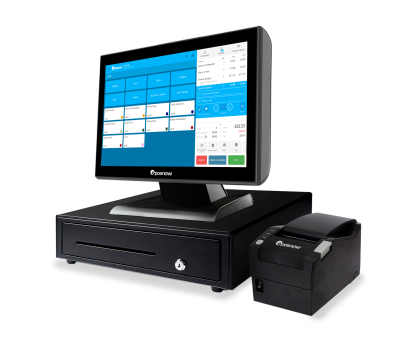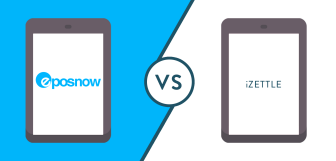Epos Now vs iZettle
With Epos Now Payments 2021 launch powering onto the card processing scene, the EPOS (electronic point of sale) climate has found itself in different waters. Businesses making financial choices about which system to go for have needed to compare not only the payment options but the software and hardware that come with it.
One comparison that has looked very different since the Epos Now Payments launch is Epos Now and iZettle. iZettle’s unique selling point for some time has been their simple, tidy payments device that comes cheap, with simple blended pay as you earn rates. But that looks very different with Epos Now providing an in-house alternative to the old-hand card companies: so how do the two compare when it comes to making a business’s working day easier?
Background and basic comparisons
Epos Now was founded by Jacyn Heavens in 2011 in Norwich, UK; iZettle was founded in Stockholm in 2010 by Jacob de Geer and Magnus Nilsson. So both companies have been learning and expanding their system capabilities for a similar amount of time.
However, the two companies started out with quite different priorities. iZettle has long prioritised the payment processing (credit card machine) side of their business; they were the first company to develop a chip reading card machine app for mobile phones[1]. This made iZettle a pioneering company when it came to making starting a business easy on the bank account and accessible for the small, low-budget entrepreneur.
This is well demonstrated with their simple, blended transaction fee for all contactless and chip transactions, which Epos Now Payments have mirrored.
Epos Now’s vision was always larger and aimed at providing full functionality. The founder, Jacyn Heavens, was a frustrated restaurant manager that couldn’t find a system that fitted his needs, so he designed one.
“I started Epos Now because I was a frustrated business owner. It's just not enough for POS systems to accept transactions, print receipts, create poor reports and yet be ludicrously expensive.” Jacyn Heavens, CEO of Epos Now
This has led to an EPOS system based around providing businesses with options and flexibility. After 10+ years, this has led to a system that can cater to both small and large businesses, retail and hospitality, online and offline and more.
Epos Now send out monthly software updates and look to make new partnerships at every opportunity to ensure businesses have the best chance to create the perfect bespoke setup to suit any enterprise:
- Streamline your sales setup to shave time during transactions and satisfy customers
- Manage inventory through barcodes, categories or previous lists, with flexible stock control technology
- Choose from hundreds of dedicated apps with business tools for every part of trade
- Receive business advice whenever you need it to get the most out of your system with an expert support team

Software differences
With such differing philosophies and aiming at slightly different parts of the market, the two companies have constructed similarly different software. While all EPOS systems provide transaction software, not all systems provide all options.
While both systems are usefully cloud-based, the two big differences between iZettle and Epos Now point of sale software is that iZettle relies on integrations with 3rd party accounting software to provide payroll and accounting functionality. This means that businesses that don’t use one of their partnered accounting programs must either switch to one of those programs or input all takings manually[2].
Not having staff features on their system has further ramifications when the small businesses they are modelled for begin to grow. iZettle software allows product adding and editing on the front till system, while the back office suite is accessed solely through web browsers.
Generally, iZettle’s simplistic transaction software makes learning or teaching staff to perform sales relatively straightforward. But, allowing new staff to edit business data opens the door to human error.
The same is true for the business reports, which are also accessible from the transaction software. This allows anyone near the till to read the data and potentially use that data to their advantage.
While startups with small, trusted teams may not consider these features too significant a drawback, this point demonstrates that growing or ambitious businesses are not as well suited to this software and may want to consider iZettle alternatives.
Epos Now’s software boasts a large range of modifiable settings to allow a business to mould their own transaction model, but provides staff role allocation, meaning that new staff do not get full access. Managers can provide access to staff only on features they have been trained and trusted to use, while controlling product and sales data themselves from the secure back office.
As you’d expect, the function-focused Epos Now software allows a wider range of integrations, including accounting software like Sage and Xero for those that prefer it to the inhouse accounts section. GetApps comparison between the two shows Epos Now’s system has a whopping 71 features to iZettle’s 11[3].
As the 2020s progress, businesses are becoming more omnichannel and more tech-dependent. Having a large selection of optional apps allows businesses using Epos Now systems to expand their operations without needing to switch EPOS, which is a large and expensive undertaking. This includes opening new stores, which can be added on to the existing structure using the popular multi-site manager app.

Hardware comparisons
iZettle’s USP is without a doubt its small, handy card reader; the device is distinct from the traditional, larger, less mobile card machines, but has the same functionality.
Nevertheless, iZettle do not have a monopoly on mobile card readers through these devices or their mobile app. Epos Now provides MPOS (mobile point of sale) in a wonderful, all-in-one package, with the transaction software and card processing in a small, convenient device for processing payments.
As with the software, Epos Now has a wider range of options for potential users. iZettle have mobile device and tablet options for running their program. This means the largest screen iZettle provide is 10.2”, while Epos Now’s android based terminal comes with 15” as standard.
For that reason, businesses with older employees, more product hotkeys, or using a standard immobile counter POS can benefit from a more traditional sales terminal. The iZettle tablets are useful, and can be taken in and out of a stand, and can connect wirelessly to cash drawers and receipt printers … but Epos Now also provide this functionality through tablet options.
Furthermore, Epos Now accessories are more extensive than iZettles, with products aimed specifically at both retail and hospitality needs. For example, a kitchen display screen showing food sales instantly to the chef, or barcode printers for shelf-edge labels.
iZettle vs Epos Now: for an all-in-one solution, go with Epos Now
For a system to do inventory management, build detailed reports as you sell, and integrate with the business tools you need to make your day easier, Epos Now provides the most flexible, functional solution.
Whether you’re in retail, hospitality, or any other trade, Epos Now systems can:
- Provide secure, safe transactions and allow control of insightful business reports
- Allow quick and easy product and stock management, including alerts on product shortages
- Integrate with hundreds of useful apps from spreadsheet downloads to marketing and loyalty programs
- Give you complete control and access using the very latest cloud technology
To find out more about what Epos Now can do for your business, submit your data below and speak with one of our expert team.
Join Epos Now for modifiable software and flexible hardware to suit your industry
trusted by over 40,000 businesses worldwide



